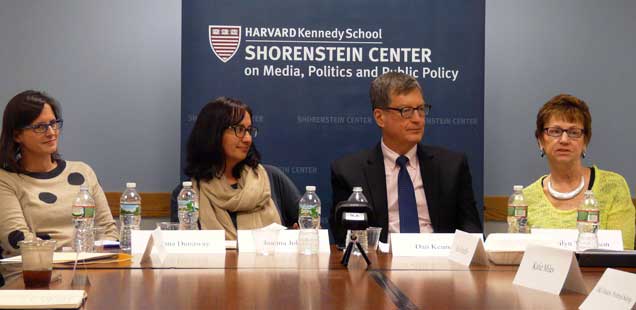Media and Politics: What’s Next? A Conversation with the Spring 2016 Joan Shorenstein Fellows

April 19, 2016 — The Shorenstein Center hosted a conversation with its Spring 2016 Joan Shorenstein Fellows: Johanna Dunaway, associate professor of communication, Texas A&M University; Joanna Jolly, South Asia editor and feature writer, BBC; Dan Kennedy, associate professor of journalism, Northeastern University; and Marilyn Thompson, deputy editor, Politico. Each fellow gave a preview of the work they conducted at the Shorenstein Center, and answered audience questions.
Johanna Dunaway discussed her research into how the changing media environment is affecting news consumption by Latinos in the United States. She decided to focus on the topic after learning that 17 percent of Latinos have mobile-only internet access. Although others have raised questions about how patterns of news engagement are changing in the digital age, most have “studied those implications as if everyone is your average white guy who sits at a desk all day in front of a wired computer and who also has a smartphone and a tablet,” said Dunaway. “We don’t tend to think about the implications of the changing media environment for people who can only access the internet through their cell phone.” Dunaway also noted that it is important to understand that Latinos in the U.S. are a very diverse group, with media consumption habits varying across age, language use, and media markets.
Joanna Jolly has been researching changes in Indian society after the coverage of the infamous 2012 gang rape in Delhi. Specifically, she wanted to analyze the nature of media coverage in English-language publications in India, and to see whether the conversation around sexual violence had changed or not. Through data analysis and interviews with reporters and editors, she found that while rape is covered more than it had been in the past, the coverage still “reinforces patriarchal stereotypes that were there before.” Additionally, the increased coverage of rape has not necessarily translated into legislative action to help women – for example, calls to criminalize spousal rape were dismissed by the government.
Dan Kennedy has been looking for lessons from The Washington Post under Jeff Bezos that are applicable to other publications. He described five ideas worth paying attention to: 1. Private ownership means that the outlet no longer has to “worry about quarterly profits [and] pleasing shareholders,” opening more room for experimentation. 2. The Post has focused on “getting as big as possible.” Although it is not clear how the Post will monetize its audience of 73 million visitors per month, “their attitude is: it’s better to figure out how to monetize a huge audience than a small one.” 3. Don’t pursue change for the sake of change – Kennedy noted that Bezos kept leaders Marty Baron and Shailesh Prakash in place. 4. Technology is central to the mission, and don’t fear change that you can’t control. The Post has “gone all in” on Facebook instant articles and Apple News. 5. “Be patient…since nobody really knows where we’re going, it’s important to be able to take a long view and not give up too quickly.”
Marilyn Thompson set out to investigate the U.S. presidential election campaign fund – which is funded through voluntary taxpayer donations on tax return forms. Although the fund has $301 million, said Thompson, “none of the candidates want this money,” and it is even nicknamed “the losers’ fund.” In the 2016 election cycle, only Martin O’Malley filed a request to access the funds. Thompson described how the fund, which used to “work effectively” and helped fund the campaigns of Jimmy Carter and Ronald Reagan, has fallen into disrepair as a result of the cost of modern campaigns. “Limited spending in an era of big money is a tricky proposition,” she said. Thompson also discussed a lack of media coverage of campaign finance issues as a result of reporters having less time to do in-depth reporting, and her recent U.S. News article analyzing how much media coverage Trump has received.
Listen to the full audio recording above.
Article and photo by Nilagia McCoy of the Shorenstein Center.